
Journalism Studies
Scope & Guideline
Pioneering Research that Transforms Media Practices
Introduction
Aims and Scopes
- Investigative Journalism:
The journal provides insights into investigative practices, challenges, and ethical considerations faced by journalists, particularly in conflict zones or under oppressive regimes. - Digital Journalism and Technology:
Research often examines the impact of digital technologies on journalism, including the use of social media, algorithms, and data journalism, highlighting how these innovations reshape news production and consumption. - Audience Engagement and Trust:
A significant focus is placed on audience interactions with news media, exploring issues of trust, misinformation, and the psychological aspects of news avoidance and engagement. - Global Perspectives on Journalism:
The journal emphasizes the importance of global and comparative studies in journalism, addressing how cultural, political, and economic contexts influence journalistic practices across different regions. - Social Justice and Representation:
There is a consistent focus on the role of journalism in promoting social justice, including representation of marginalized groups, gender issues, and the ethical responsibilities of journalists. - Metajournalism and Professional Identity:
The journal investigates the evolving identities of journalists, including their roles, perceptions, and the impact of societal changes on their professional practices.
Trending and Emerging
- Impact of Misinformation and Disinformation:
The rise of misinformation as a critical issue has led to a surge in research addressing how journalists navigate and combat false information, particularly in the context of social media. - Journalism and Health Communication:
The COVID-19 pandemic has highlighted the role of journalism in health communication, leading to an increase in studies focused on how health-related issues are reported and perceived by the public. - Algorithmic Journalism:
There is a growing interest in the role of algorithms in news production and dissemination, with research examining how algorithmic decision-making affects journalistic practices and audience engagement. - Emotional Labor in Journalism:
The emotional aspects of journalism, including the impact of stress and trauma on journalists, are increasingly recognized, prompting discussions on mental health and well-being in the profession. - Diversity and Inclusion in Journalism:
Research on diversity, equity, and inclusion within journalism is gaining prominence, focusing on representation in news coverage and the experiences of journalists from marginalized communities. - Collaborative Journalism Practices:
Emerging studies explore collaborative journalism, where journalists work alongside communities and non-traditional actors, reflecting a shift towards more participatory forms of news production.
Declining or Waning
- Traditional Journalism Ethics:
Discussions surrounding traditional ethics in journalism appear to be decreasing, as newer frameworks that incorporate digital and participatory ethics gain traction. - Local Journalism Challenges:
Although local journalism remains important, the specific challenges faced by local outlets are less frequently addressed, possibly overshadowed by broader discussions on global media dynamics. - Crisis Journalism:
Research specifically focused on crisis journalism, while still relevant, has seen a reduction in standalone studies, as many of these themes are integrated into broader discussions on digital and audience engagement. - Historical Journalism Studies:
The exploration of historical contexts and practices in journalism appears to be declining, with more emphasis on contemporary issues and future-oriented studies. - Cultural Journalism:
The focus on cultural journalism, including arts and entertainment reporting, has waned, as the journal's scope shifts more toward political and social issues in journalism.
Similar Journals

Vestnik Moskovskogo universiteta. Seriya 10. Zhurnalistika
Illuminating Ethics in Journalism ResearchVestnik Moskovskogo universiteta. Seriya 10. Zhurnalistika, published by the prestigious M V Lomonosov Moscow State University, serves as a vital conduit for scholarly discourse in the fields of journalism and communication. With an ISSN of 0320-8079 and an E-ISSN of 0320-8079, the journal showcases rigorously peer-reviewed research and theoretical contributions that span diverse aspects of media studies, social communication, and journalism ethics. As of 2023, it is classified within the Q3 category in both Communication and miscellaneous Social Sciences, ranking #372 out of 511 and #445 out of 604, respectively, indicating its growing influence and relevance in these crucial academic domains. Despite not being Open Access, researchers and students alike can leverage the journal's valuable insights, which continue to shape contemporary understanding of media's impact on society. With a commitment to excellence and a focus on the rapidly evolving landscape of journalism, Vestnik Moskovskogo universiteta. Seriya 10. Zhurnalistika remains an essential resource for anyone looking to engage deeply with current debates and developments in the communication field.
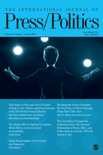
International Journal of Press-Politics
Unraveling the Dynamics of Press and Political PowerThe International Journal of Press-Politics, published by SAGE Publications Inc, stands as a premier scholarly platform at the intersection of communication, sociology, and political science. With a distinguished history dating back to its inception in 2003 and maintaining its relevance through 2024, this journal is recognized in the academic community for its rigorous exploration of the dynamics between the media and political processes. The journal proudly holds a Q1 ranking in both Communication and Sociology and Political Science categories, placing it in the top tier of its field, underscored by its impressive Scopus rankings, which reflect its global influence and reach. With an intention to foster innovative research and discourse, IJPP is committed to being accessible, contributing significantly to the understanding of how press and politics shape societal narratives, thus serving as an essential resource for researchers, professionals, and students alike. Explore this esteemed journal to engage with cutting-edge studies that drive the field forward.

Analisi-Quaderns de Comunicacio i Cultura
Navigating the evolving narratives of culture and communication.Analisi-Quaderns de Comunicacio i Cultura, published by Universitat Autònoma de Barcelona, is a distinguished open-access journal that has been serving as a pivotal platform for interdisciplinary research in Communication and Cultural Studies since its inception. With an ISSN of 0211-2175 and E-ISSN 2340-5236, this journal not only contributes significantly to its fields, as evidenced by its impressive rankings—Q2 in Communication and Q1 in Cultural Studies for 2023—but also boasts strong Scopus placements, including a rank of 181 out of 1304 in Cultural Studies. The journal's commitment to open access since 2010 ensures that research findings are readily available to a global audience, fostering collaboration among scholars, practitioners, and students. Located in Cerdanyola del Vallès, Barcelona, this publication invites contributions that explore the dynamic and rapidly evolving intersections of culture and communication, making it an essential resource for those seeking to advance knowledge and engage critically in these essential areas of study.

Connectist-Istanbul University Journal of Communication Sciences
Unlocking Insights for a Connected WorldConnectist-Istanbul University Journal of Communication Sciences is a distinguished academic publication under the auspices of Istanbul University, Faculty of Communication, dedicated to advancing the field of communication studies. Since its inception, this Open Access journal has facilitated the dissemination of groundbreaking research and innovative methodologies, particularly since it embraced an open access model in 2017, promoting wider accessibility and engagement. As a pivotal resource for researchers, practitioners, and students alike, Connectist fosters interdisciplinary dialogue, exploring contemporary issues in communication, media studies, and related disciplines. With a commitment to rigorous peer review and scholarly excellence, the journal serves as an essential platform for cutting-edge insights and developments in communication sciences, thereby contributing significantly to the academic community and beyond.
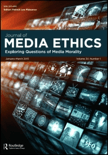
Journal of Media Ethics
Advancing Conversations on Media Ethics.Journal of Media Ethics, published by Routledge Journals, Taylor & Francis Ltd, is a pivotal platform for scholars and practitioners interested in the intersection of media, ethics, and communication. Operating since 2015, this esteemed journal has consistently contributed to the discourse on ethical frameworks in contemporary media practices, making significant strides in the fields of communication and philosophy. With an impressive Q2 category ranking in Communication and a Q1 category ranking in Philosophy as of 2023, the journal demonstrates its influence and relevance, achieving Scopus ranks that place it in the top 87th percentile for Philosophy and the 62nd percentile for Communication. Despite being a subscription-based journal, it caters to an interdisciplinary audience eager to explore the ethical dimensions of media in a rapidly evolving digital landscape. Researchers, professionals, and students alike will find valuable insights and innovative research within its pages, underscoring the importance of ethical considerations in framing media narratives.
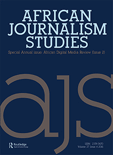
African Journalism Studies
Connecting scholars to the heart of African journalism.African Journalism Studies is a leading journal dedicated to advancing the field of journalism research within the African context. Published by Routledge Journals, a prestigious division of Taylor & Francis Ltd, this journal features a rich repository of scholarly articles that explore critical issues in journalism, media practices, and communication strategies across the continent. With an impressive Q2 ranking in Communication for 2023, African Journalism Studies is recognized for its influence and quality, ranking #202 out of 511 journals in social sciences communication and maintaining a 60th percentile position. Despite being a non-open access publication, it remains essential for researchers, professionals, and students looking to deepen their understanding of the dynamics of journalism in Africa, offering insights into converged media practices from 2015 to 2024. The journal contributes significantly to the academic discourse, fostering a more profound knowledge base and encouraging informed discussions that reflect the evolving landscapes of African journalism.
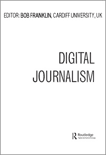
Digital Journalism
Advancing the Future of News in a Digital WorldDigital Journalism is an esteemed academic journal dedicated to advancing the interdisciplinary field of digital communication and journalism. Published by Routledge Journals, Taylor & Francis Ltd, this journal has established itself as a leading resource with a noteworthy Q1 rank in Communication for 2023, placing it among the top tier of journals in this dynamic field. With its ISSN 2167-0811 and E-ISSN 2167-082X, it serves as a pivotal platform for researchers, professionals, and students interested in exploring the intersection of technology and journalism, publishing insightful studies that address contemporary challenges and innovations. The journal has been continually evolving since its inception in 2013 and is set to extend its reach until 2024, consistently attracting high-quality scholarly contributions. With a distinguished rank of 11 out of 511 in Scopus's Social Sciences - Communication category, and boasting an impressive 97th percentile, Digital Journalism is an essential read for anyone keen on understanding the future of news in the digital era.

Revista Mediterranea Comunicacion-Journal of Communication
Bridging Cultures with Scholarly InsightRevista Mediterranea Comunicacion - Journal of Communication, published by UNIV ALICANTE, stands as a significant platform for scholars and practitioners in the fields of Communication and Cultural Studies. With an impact factor that firmly places it in Q2 for Communication and Q1 for Cultural Studies, this open-access journal promotes scholarly dialogue through a rich array of articles, encouraging international discourse that spans various cultural and communicative phenomena. Since its inception in 2010, the Revista Mediterranea Comunicacion has made substantial contributions to understanding contemporary communication dynamics, supported by a growing reputation evidenced by its commendable Scopus rankings—144th in Cultural Studies and 181st in Communication. Researchers, professionals, and students are invited to explore and contribute to this journal, further enhancing the understanding of communication within diverse social contexts.

Journalism and Media
Pioneering Insights in Journalism and Media StudiesJournalism and Media is a premier, peer-reviewed academic journal hosted by MDPI, dedicated to advancing knowledge in the fields of journalism, media studies, and communication. Established in 2020, this Open Access journal aims to facilitate the dissemination of high-quality research free of cost, promoting inclusivity and accessibility in academia. Additionally, it boasts a substantial reputation, reflected in its impressive Q1 rankings in both the Arts and Humanities as well as Linguistics and Language, and a Q2 category standing in Social Sciences (miscellaneous) for 2023. With Scopus rankings placing it within the top 15% of journals in its field, Journalism and Media not only contributes significantly to contemporary discourse but also provides an essential platform for interdisciplinary collaboration and innovation. Researchers, professionals, and students alike are encouraged to engage with the journal’s rich array of articles that explore the complexities of media dynamics, journalistic integrity, and the impact of technology on communication practices.
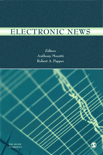
Electronic News
Transforming Perspectives on News in the Digital Age.Electronic News, published by SAGE PUBLICATIONS INC, stands at the forefront of scholarly communication, focused on the dynamic intersection of media, technology, and society. With an ISSN of 1931-2431 and an E-ISSN of 1931-244X, this journal has established itself as a valuable resource for academics and professionals alike, exploring critical themes in communication and information systems. Operating from its base in the United States, Electronic News operates within a competitive landscape, boasting a commendable Q2 ranking in Communication and a Q3 ranking in Information Systems. This reflects its commitment to high-quality research and impactful insights, as evidenced by its Scopus rankings, where it ranks #238 out of 511 in Social Sciences Communication and #302 out of 394 in Computer Science Information Systems. Although currently embracing a traditional subscription model, the journal serves as a crucial platform for disseminating knowledge that shapes the future of news and media in a rapidly evolving digital age. As it converges from 2009 to 2024, Electronic News continues to invite contributions that address the multifaceted challenges and innovations of news media, making it an essential resource for researchers, practitioners, and students eager to engage with contemporary issues in communication.